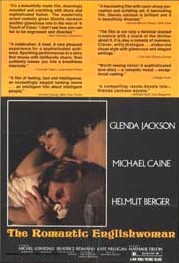There is no whole thing. You have to make it work. Divorced thirtysomething recruitment agent Alex Greville (Glenda Jackson) begins a romantic relationship with glamorous sculptor Bob Elkin (Murray Head), aware that he’s also intimately involved with lonely middle-aged Jewish doctor Daniel Hirsh (Peter Finch). Bob takes off from the weekend babysitting for Alex’s friends the Hodsons (Vivian Pickles and Frank Windsor) in order to spend time with Daniel. The younger man represents a break with the pasts of both Bob’s older lovers, and neither is willing to let go of the love and vitality he brings to their mundane lives although he’s planning to leave for New York … I know you’re not getting enough of me but you’re getting all there is. Film critic Penelope Gilliatt’s screenplay, suggested by material she plumbed in her novel One by One, is a deep delve into the compromises and deceptions people make in order to have a little happiness. The North London setting with its population of slightly boho middle class types conceals the fact that the story is told rather cleverly, through the shared answering service, tales that Daniel is told by his patients, the insights of the precocious children Alex is minding and her mother’s truisms about marriage. The autumnal scenes carving out a season of political unrest hint at the melancholy truth that these are people who live in fear of rejection, hesitant about commitment, afraid to make a permanent display of emotion in a film which wears its protagonists’ pathology on its shirt sleeve, a patina of loss. It’s amusing to see both Alex and Daniel cruise past Bob’s flat late at night, fearful there might be yet another person claiming his affection. Alongside the brilliant performances of the leads, with Finch a standout, there’s legendary silent actress Bessie Love as an answering service operator; Tony Britton in search of a job and winding up with a one night stand; and a very young Daniel Day-Lewis as a car vandal. How apposite for Jon Finch to be hustling his namesake, narrowly avoiding a late night arrest in Piccadilly Circus. Directed by John Schlesinger, whose best film this is, about a world he fully inhabits. He also contributed to the screenplay for this landmark in gay representation, along with David Sherwin and Ken Levison, who are thanked for their assistance in the credits. Some people believe something is better than nothing, but I’m beginning to believe that nothing can be better than something


